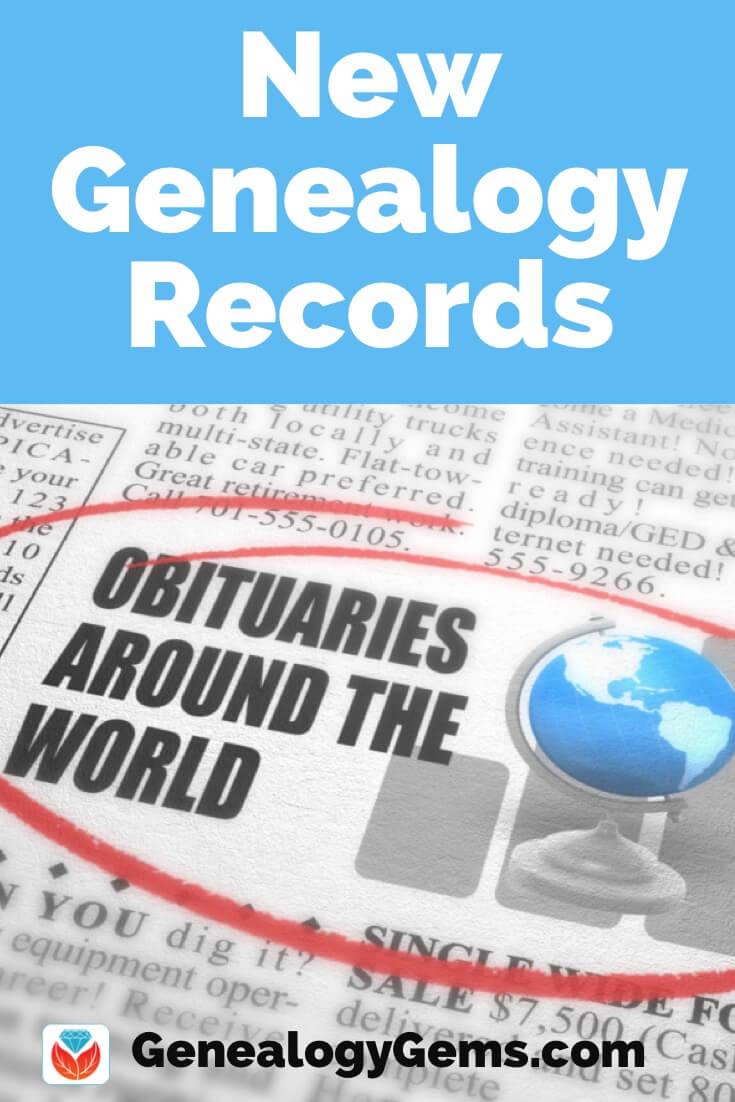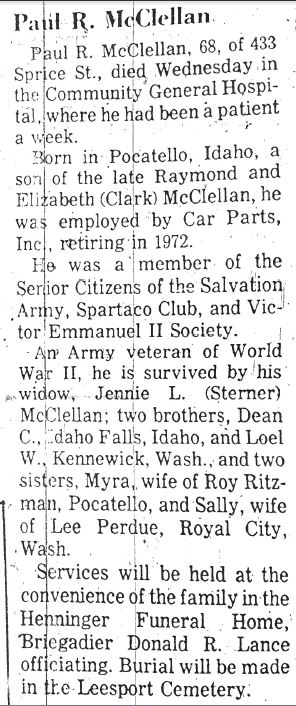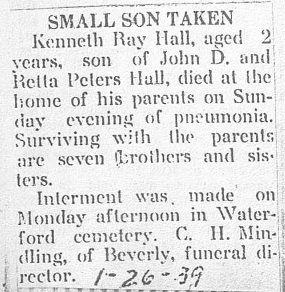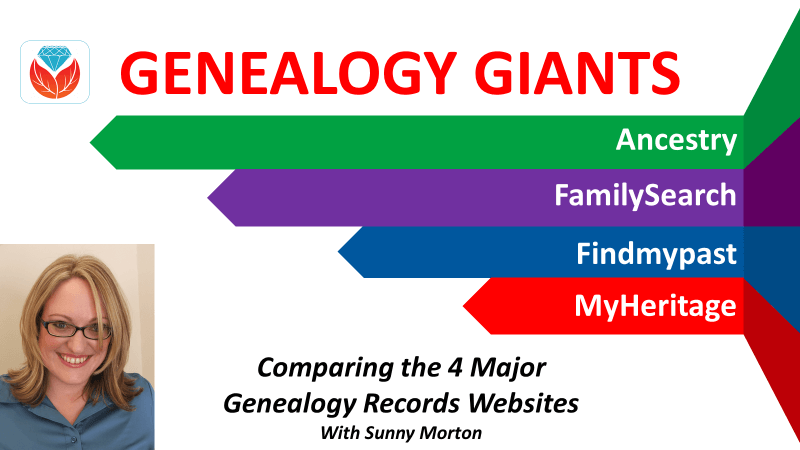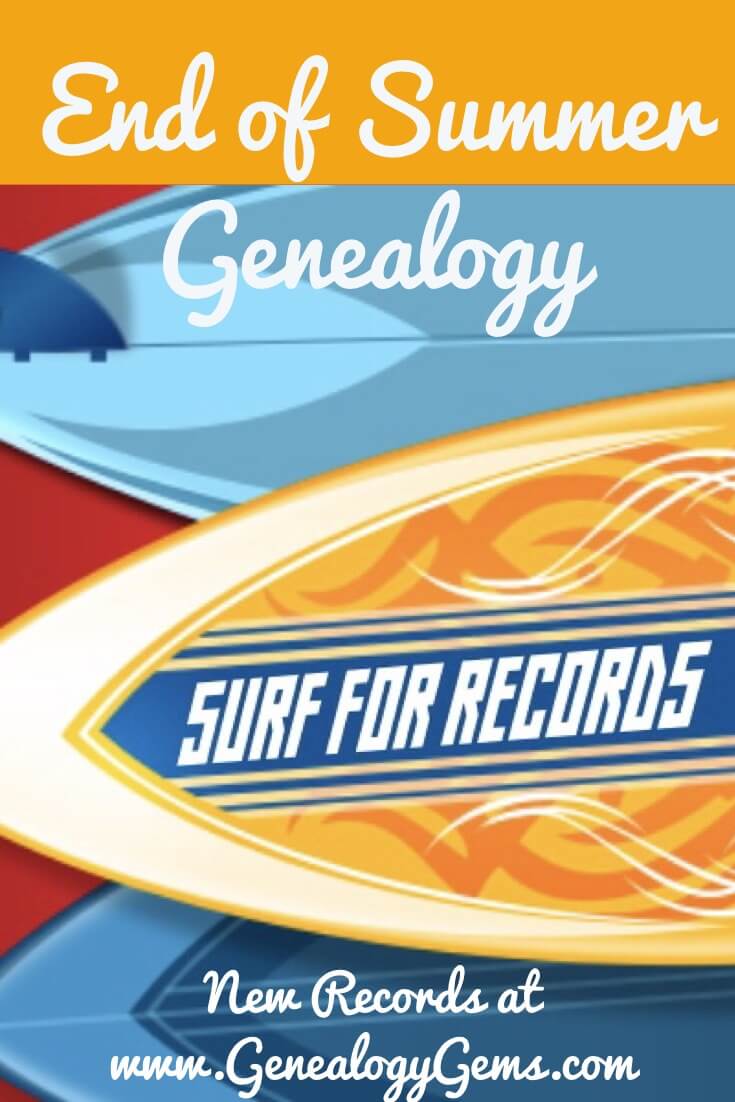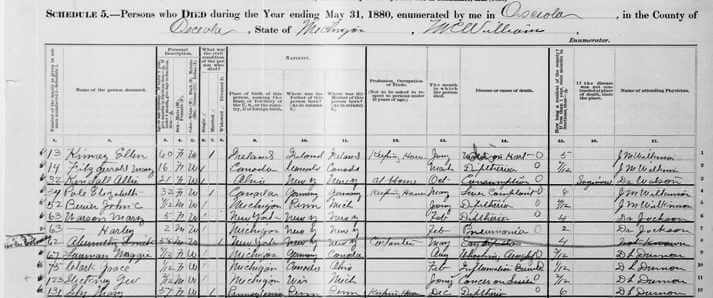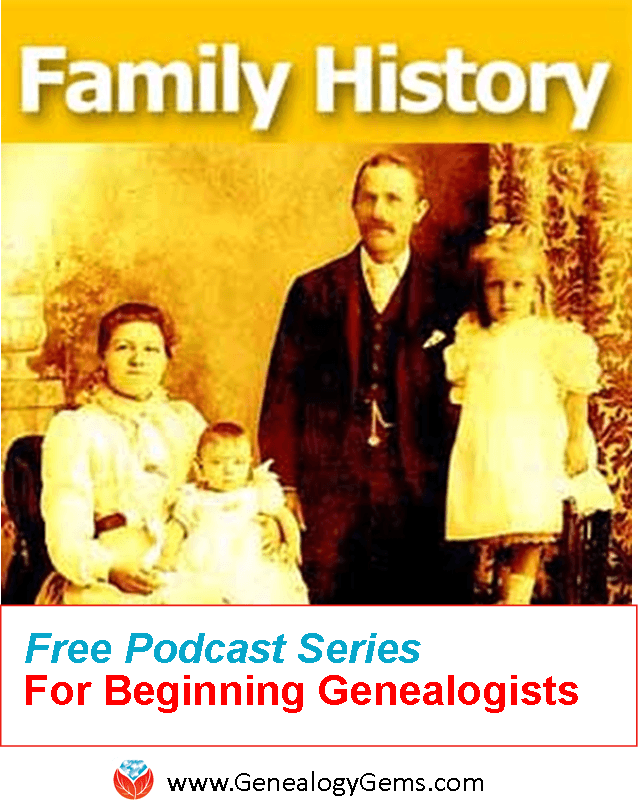Blog

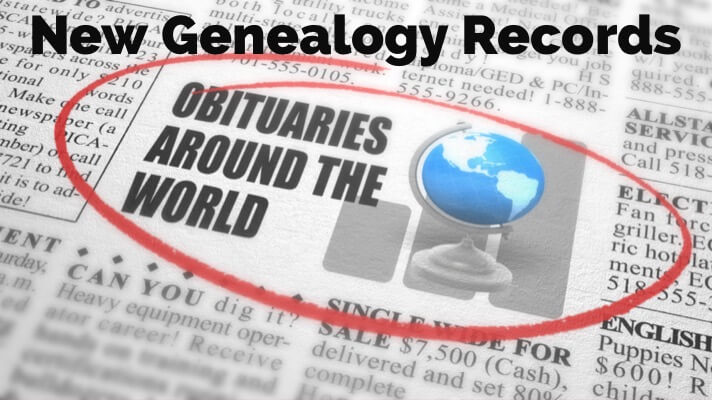
Millions of Obituaries from Around the World
Obituaries and death indexes feature prominently in recently-updated collections at Ancestry.com. These collections take us around the world: from Australia to the U.S., Canada, England, Scotland, Ireland and Wales, then to Germany and The Netherlands.
Featured: Obituaries and death indexes
Genealogy giant subscription website Ancestry.com has updated 17 collections, several of which relate to obituaries and other death records. Many of these collections focus on recent deaths, which may not seem as valuable at first glance. But many obituaries contain genealogical clues back one or two or more generations, helping you link ancestors and descendants to each other in your family trees.
Furthermore, clues about a person’s death can lead you to all kinds of additional records: civil or church death records, tombstone inscriptions, cemetery and funeral records, wills and probate records, and even memorials in church or civic publications. So this is one must-have record type for every possible person on your tree for the past 100 years, or even more!
All the following collections come from Ancestry.com, where you can go to Search > Catalog to find the individual collections named below. (Just enter the collection title in part or full.)
Australia/New Zealand obituaries
“Australia and New Zealand, Obituary Index, 2004-2018,” now has more than 377,000 records. This is a fairly recent collection, but we also reported last month on updates to a sister collection of Australian newspaper vital notices dating back to the 1830s.
British Isles obituaries and deaths
An offsite collection that’s indexed on Ancestry, “Web: UK, Coal Mining Accidents and Deaths Index, 1878-1935,” now has nearly 103,000 records. According to the collection landing page, “This data is published by The Coalmining History Resource Centre. You can often find additional information by visiting the source website, including references, publication information, comments, historical context, and even images.”
The “England and Wales, Death Index, 2007-2017” at Ancestry.com now has more than 1.2 million records. The collection description says, “This collection is a compiled index that covers approximately 55% of the total deaths that occurred in this time period. This index provides death details for people in England and Wales, specifically their name, gender, date of birth or age at death, date of death, and residence place at death.”
“UK and Ireland, Obituary Index, 2004-2018” now claims more than 1.6 million records of recent deaths. “The collection contains obituaries from hundreds of newspapers. We work with partners to scour the Internet regularly to find new obituaries and extract the facts into our database. Where available we include the original URL link to the source information.”
The “Scotland and Northern Ireland, Death Index, 1989-2017” now includes over 525,000 records. It’s “a compiled index that covers approximately 45% of the total deaths that occurred in this time period. This index provides death details for people in Scotland and Northern Ireland, specifically their name, gender, date of birth or age at death, date of death, and residence place at time of death. However, they do not include the General Register Office (GRO) reference information. The index also contains a small number of records for people in Jersey and Isle of Man.”
Canada obituaries and notarial records
Ancestry’s collection of “Quebec, Canada, Notarial Records, 1637-1935” now tops 16.5 million records! According to the site, “Notarial records are private agreements (contracts), written by notaries, who are considered legal professionals. This collection consists of notarial records for Quebec from the years 1637 to 1935. Each notary set up practice and kept sets of records for documents they created.”
Looking for Canadian obituaries? The “Canada, Obituary Collection, 1898-2018” now has more than 1.4 million entries. Its historical depth—more than 100 years—and its inclusion of recent deaths set it apart from some other obituary indexes reported here.
Germany vital records
The collection “Mainz, Germany, Births, Marriages and Deaths, 1798-1875” now has nearly 900,000 records. The site offers excellent background for this database: “The current capital of the Rhine-Palatinate state in Germany, Mainz has a rich and storied history….Since the late 18th century, Mainz has been at times under French, Prussian, and German rule, and for a brief spell, it was a democratic free state.
“Initially, registrations of births, marriages, and deaths were kept by religious denominations, but with French occupation in the 1790s, a system of civil registration modeled on the French system was implemented in 1798. This collection includes civil registrations of births, marriages, and deaths beginning in 1798 and extending to 1875. In 1876, civil registration was implemented across unified Germany, and some of those records can be found in other Ancestry collections.”
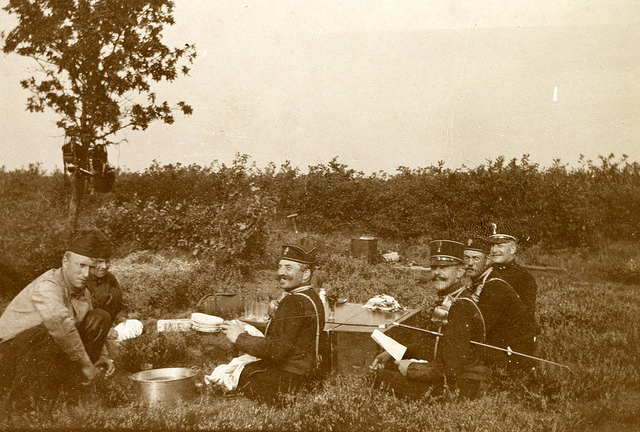
“Exercise Field Artillery Corps” album, image AKL092038, Netherlands Institute of Military History uploads at Flickr Creative Commons, https://www.flickr.com/photos/nimhimages/16026248719/.
The Netherlands: Obituaries and more
The Ancestry.com collection “Netherlands, Newspaper Announcements Index, 1795-1945” now has over 5 million records. “This collection consists of an index to announcements and advertisements from various newspapers. Approximately forty percent of the records are death (Overlijden) announcements. Just under one-quarter of the records are birth (Geboorte) announcements, and nearly as many are miscellaneous (Diversen) announcements or advertisements. The remaining records consist of marriage (Huwelijk) announcements. Details vary depending on the event….Also included is the name of the archive where the original record can be found, as well as a link to the record on the source website. In most cases, additional information about the original record will be available via that link. In some cases, images of the original records may be available via that link as well.”
United States obituary and death records
Two enormous collections of U.S. obituary and other death records have been updated at Ancestry.com. “U.S., Cemetery and Funeral Home Collection, 1847-2018” has passed 9 million records. The site describes the collection as one harvested from cemetery and funeral home records all over the Internet (to which individual entries link, wherever possible). A related collection, “U.S., Obituary Collection, 1930-2018,” now has nearly 40 million records, and is also described as a compilation of records gleaned from many resources online.
Got Oregon Trail ancestors? The “Willamette Valley, Oregon, Death Records, 1838-2006” collection now has more than 158,000 records. It “contains a collection of various death records for Willamette Valley, Oregon. Most are from Marion County. They include funeral home records, cemetery records, newspaper obituaries, and death certificates transcribed or compiled by members of the Willamette Valley Genealogical Society.”
Now topping 5 million records, the “New York, Death Index, 1852-1956” collection “consists of indices of deaths from the state of New York. Details vary, but may include the following information for the deceased: name, death date, death city, age at death, gender [and] certificate number.”
More to learn about obituaries
Not motivated enough yet to pursue obituaries for your relatives? Read our free article, 12 things you can learn in obituaries, and you’ll probably change your mind! An obituary isn’t just a record of a death: it’s often a window into a lifetime.

About the Author: Sunny Morton
Sunny is a Contributing Editor at Lisa Louise Cooke’s Genealogy Gems; her voice is often heard on the Genealogy Gems Podcast and Premium Podcasts. She’s known for her expertise on the world’s biggest family history websites (she’s the author of Genealogy Giants: Comparing the 4 Major Websites); writing personal and family histories (she also wrote Story of My Life: A Workbook for Preserving Your Legacy); and sharing her favorite reads for the Genealogy Gems Book Club.
Disclosure: This article contains affiliate links and Genealogy Gems will be compensated if you make a purchase after clicking on these links (at no additional cost to you). Thank you for supporting Genealogy Gems!
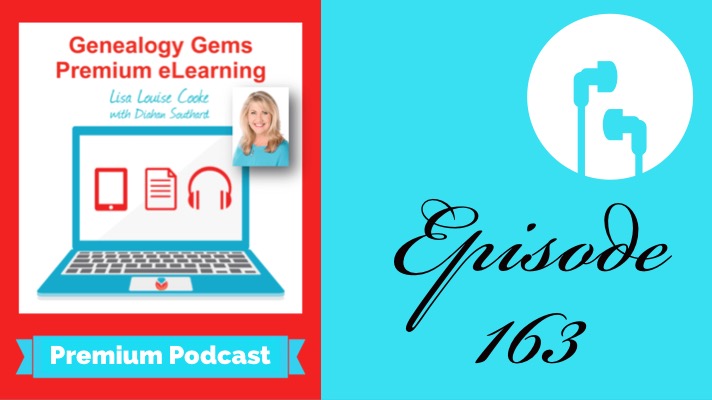
Here’s what you’ll hear in Genealogy Gems Premium Podcast 163
In the new Genealogy Gems Premium Podcast Episode 163, you’ll hear what’s happening with a trove of 160,000 pieces of undelivered mail dating back to the 1600s, an adoptee’s personal response to Premium Episode 162, and tips on finding U.S. Navy photos. Plus, hear the exclusive interview with Joe Everett of the Family History Library at Brigham Young University in Utah and thoughts from Your DNA Guide Diahan Southard on DNA crime samples.
To Premium eLearning members: get out your earbuds! A new episode is ready for your listening pleasure.
Host and producer Lisa Louise Cooke starts off Genealogy Gems Premium Podcast 163 with a fascinating news update about “The Prize Papers” Undelivered Mail. About 160,000 undelivered (and in some case, unopened) letters are currently being cataloged by the Prize Papers Project. These letters span from the 17th to the 19th century. Though these letters may not have been written by your direct ancestors, they can provide a rare glimpse into the daily lives of folks just like them. Lisa will fill you in on what’s been discovered and what you can expect as this project progresses.
Do you have old family letters? What supporting detail can be gleaned from them about the life that your ancestor lived? Even the seemingly mundane could be a treasured detail! Stay tuned for updates about this exciting collection, and in the mean time, take steps to preserve the letters in your own collection. (Check out the Archive Lady Melissa Barker’s easy 4-step process!)
Other highlights of Premium Podcast Episode #163
We love when our members write in with their personal stories and questions. It’s a chance for us to hear what your challenges are so that we can help, and to share in your successes when you make a breakthrough. We received many wonderful responses to Premium Episode 162 about dealing with the unexpected with your DNA results. In this episode, we’ll share a particularly powerful response from a listener. In this episode you’ll also get expert advice from our wonderful contributors:
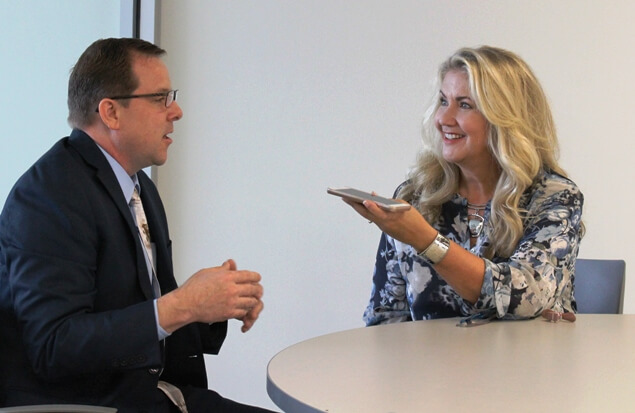
- Military Minutes Michael Strauss answers a listener’s question on finding U.S. Navy photos
- An interview with Joe Everett of the Family History Library at Brigham Young University in Utah (image left)
- A new Book Club recommendation
- Follow-up thoughts from Your DNA Guide Diahan Southard on DNA crime samples
New Member? Here’s How to Listen to the Premium Podcast
Whether you want to listen on your smartphone, or your computer, we’ve got you covered. The “Premium Podcast Feed” allows you to listen to the Premium Podcast and get new episodes automatically on your computer or mobile device. As new episodes are uploaded, they will automatically be added for you while you are a Premium Member. Sign into your membership in the upper left corner of the main menu, and then visit the Genealogy Gems Premium Podcast Help page for full instructions.
Premium eLearning Videos
The latest new addition to the Premium Video collection included with membership is Comparing the Genealogy Giants: Ancestry.com, FamilySearch, Findmypast and MyHeritage. Veteran industry insider Sunny Morton covers the 4 major records website’s best features and strenghts, cautions or challenges for working with each one. This full-hour video includes a downloadable handout. Click here to sign in and watch it now! (Not a member? Join Premium eLearning today for less than $5 per month!)
Lacey Cooke
 Lacey has been working with Genealogy Gems since the company’s inception in 2007. Now, as the full-time manager of Genealogy Gems, she creates the free weekly newsletter, writes blogs, coordinates live events, and collaborates on new product development. No stranger to working with dead people, Lacey holds a degree in Forensic Anthropology, and is passionate about criminal justice and investigative techniques. She is the proud dog mom of Renly the corgi.
Lacey has been working with Genealogy Gems since the company’s inception in 2007. Now, as the full-time manager of Genealogy Gems, she creates the free weekly newsletter, writes blogs, coordinates live events, and collaborates on new product development. No stranger to working with dead people, Lacey holds a degree in Forensic Anthropology, and is passionate about criminal justice and investigative techniques. She is the proud dog mom of Renly the corgi.

Millions of New Free Genealogy Records at FamilySearch
Get ready to ride the last waves of summer at FamilySearch with their millions of newly published free genealogy records! Major new or updated collections include England and Wales Wills and Probate Calendar; French census and church records; South Africa probate; and in the US, Illinois naturalizations, Michigan vital records, US-Canada border crossings and WWI American Expeditionary Forces deaths.
England and Wales wills and probate index
The always-free Genealogy Giant FamilySearch.org has published England and Wales, National Index of Wills and Administrations, 1858-1957. With just over a million records, it references the National Probate Calendar, an index to wills and administrations recorded in these countries.
According to The National Archives (UK), “As well as the full name, address and occupation of the deceased, the National Probate Calendar may also contain: full names of executors, administrators and relationships to the deceased; the date and place of the death; the date and place of the probate or administration grant; [and] value of the estate.”
France census and church records
A new collection of France, Haute-Garonne, Toulouse, Church Records, 1539-1793 at FamilySearch includes close to half a million records. These are “Church records (registres paroissiaux) of baptisms, marriages, and burials within the custody of the Municipal Archives of Toulouse (Archives municipales de Toulouse). Includes marriage banns (bans de mariages). Most records are for Catholics, although there are a small quantity of available records for Protestants. Availability of records is largely dependent on time period and locality.”
Also for France, more than 160,000 indexed records have been added to France, Saône-et-Loire, Censuses, 1836.
South African probate records
Just shy of 800,000 indexed records have been added to the free FamilySearch database, South Africa, Transvaal, Probate Records from the Master of the Supreme Court, 1869-1958. According to the collection description, “South African probate records often include heirs, locations, property transfers, wills, and other important information. The most useful records in the collection are the death notices which give detailed information. The probate records usually have multiple pages and are included in a probate file, which is identified by a probate number.”
United States genealogy records
Illinois naturalizations. Over 626,000 indexed records have been added to FamilySearch’s Illinois, County Naturalization Records, 1800-1998. The content and county coverage vary by time period; most records date previous to 1945. This index could prove quite helpful to those seeking naturalization papers for immigrant ancestors who lived in Illinois, as there was no single court in which to naturalize before 1906—so immigrants could (and did) go to several different places.
Michigan vital records. Two important new collections are now free at FamilySearch:
- Michigan, County Births, 1867-1917. Nearly ¾ of a million indexed records appear in this new collection, which currently includes records from 53 of Michigan’s 83 county courthouses (time-period coverage varies by county). Delayed birth records are among the records. The collection description has this helpful note about how complete birth records are in the state: “Clerks of each County Court recorded births that were reported by parents, doctors and midwives beginning in 1867. This information was then sent to the secretary of the state. From 1867 to 1879, about 15% to 20% of the births were recorded; from 1880-1902, coverage increased to about 60% to 70%. The state required counties to begin recording births to document the occurrence of a birth and to track public health issues.”
- Michigan Mortality Schedules, 1850-1880. Nearly 40,000 deaths are recorded in this new collection of indexed images taken from the US census special census schedule for deaths recorded in 1850, 1860, 1870 and 1880. The site explains: “Mortality Schedules…list people who died in the year preceding the census….:Jun 1849 – May 1850, Jun 1859 – May 1860, Jun 1869-May 1870, and Jun 1879 – May 1880.” Here’s what these records look like:
US – Canada border crossings. FamilySearch has expanded its collection of free border-crossing records with a new index: United States, Border Crossings from Canada to United States, 1894-1954. It’s “an index of aliens and citizens crossing into the United States from Canada via various ports of entry along the U.S.-Canada border” (see also an overlapping and much larger FamilySearch collection of Canada-to-US border crossing records here).
US – WWI Expeditionary Forces. A new collection at FamilySearch indexes more than 75,000 deaths in United States, World War I American Expeditionary Forces Deaths, 1917-1919. “This collection contains information regarding soldiers who lost their lives while serving with the American Expeditionary Forces (AEF) during World War I. Each officer’s entry includes their name, rank and organization that they were assigned to at the time of their death, and the date of death. Each enlisted man’s entry includes the above information as well as their military serial number.”
Another free genealogy resource for you
Ready to learn step-by-step how to trace your family history? Listen to Lisa Louise Cooke’s free podcast series, Family History: Genealogy Made Easy. This series of 45 episodes walks you through the essentials of research, like finding and contacting living relatives, understanding various kinds of genealogical record types and even organizing strategies so you’ll be able to keep track of what you’ve discovered. It’s free and easy to listen–you only have to decide whether to listen to every episode or just pick the ones you need the most!

About the Author: Sunny Morton
Sunny is a Contributing Editor at Lisa Louise Cooke’s Genealogy Gems; her voice is often heard on the Genealogy Gems Podcast and Premium Podcasts. She’s known for her expertise on the world’s biggest family history websites (she’s the author of Genealogy Giants: Comparing the 4 Major Websites); writing personal and family histories (she also wrote Story of My Life: A Workbook for Preserving Your Legacy); and sharing her favorite reads for the Genealogy Gems Book Club.
Disclosure: This article contains affiliate links and Genealogy Gems will be compensated if you make a purchase after clicking on these links (at no additional cost to you). Thank you for supporting Genealogy Gems!

